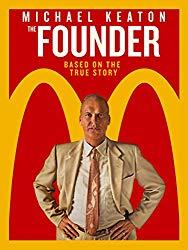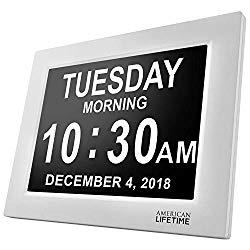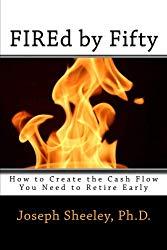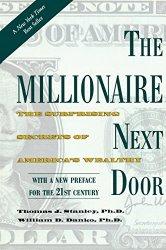Advertisers and salesmen like to tell us that we deserve things. We deserve a break today. We deserve a vacation. We deserve a nice place to live. We deserve a drink. They know that if they tap into the human emotion of entitlement, it will cause us to let go of our money and buy their product. Sure, no one really needs anything done to them at a spa, but if you convince people that they deserve it, you can get them to spend $1,000 at a spa for a day bathing in mud or lying on a bed of warm stones.

Lately, there’s been a change in values where people are starting to value freedom with their time and health more than material possessions. In the past, it was seen as the sign of a great man to work long hours and rise to high ranks at a company. This was done to achieve prestige and wealth. Sure, you were never home more than a few hours per day to sleep, but you had a nice house and beautiful family that you never saw. As women started changing roles from caretakers to earners, they also started being pushed to work more and gain more material wealth and social prestige. Because men didn’t tend to fall back to the role as caretakers, this meant that no one was raising the children so couples were having children that they never saw growing up and wondered why their relationships were so weak with their adult children later in life. Often, women would get to the end of a career and discover, as the men of previous generations did before them, that much in the corporate world is empty and meaningless. Few people get to the end of their lives and wish that that had spent more time at the office, but plenty do so and are happy with all of the time that they spent with their family and experiences that they have had.
(Note, if you click on a link in this post and buy something from Amazon (even if you buy something different from where the link takes you), The Small Investor will receive a small commission from your purchase. This costs you nothing extra and is the way that we at The Small Investor are repaid for our hard work, bringing you this great content. It is a win-win for both of us since it keeps great advice coming to you (for free) and helps put food on the table for us. If you don’t want to buy something from Amazon or buy a book, how about at least telling your friends and family about our website as a great place to learn about investing and personal finance. Thanks!)
Putting in a lot of hours does not only take away freedom with your time. It also can have a severe effect on your health. It is often said that those who are young trade health for wealth, while those who are old trade wealth for health. When you’re in your twenties, trying to get ahead, you might spend long hours at a desk, eating junk food and drinking in high levels of caffeine while never having time to exercise and think that is just what you need to do. You might also put your body at risk, taking short-cuts to get physical tasks done faster and overexerting yourself to produce more quickly. You might also accept breathing in less than healthy gases and touching questionable substances because it is just part of the job. These choices can lead to poor health later in life, limiting what you can do and resulting in your spending money in an effort to improve your health. In some cases, it can rob years or even decades of life from you later.

Beyond simply wearing your body down through work, giving up too much time while you are young can make you miss out on things. There are a lot of physical activities like rock climbing, skiing, or even hiking rugged trails you can do when you’re in your teens, twenties, and thirties without much worry because you can just jump up from a tumble or a fall with a bruise or two. By the time you’re in your late forties and fifties, you need to start taking serious consideration of activities that could result in bones breaking since you just don’t bounce back like you did in your twenties. When you are a father or mother, you can be out there with your kids, crawling through tunnels, jumping across rocks, and sledding down hills. By the time you’re a grandparent, you might be relegated to sitting on a bench watching them play. (Sadly, many parents have taken up this role now, as social media now takes up a great deal of their time.)
Money is time
The expression, “Time is money,” has been around for a long time. Many people don’t realize, however, that money is also time. If you worked an hour and got paid $20, that $20 bill in your pocket is an IOU for the time that you spent. You did something for someone else that they wanted and traded your time to them. Now you get to trade that money to someone else for something that you want. It is a hold on someone else’s’ time. Luckily, there are plenty of other people out there willing to trade their time for money so that you can redeem your coupon.

You can use money that you have accumulated to purchase free time. You could spend a few hours changing the oil in your car, or you could pay someone $25 to do it for you. You could spend an hour mowing your lawn, or you could pay someone $30 to do it. The more free cash flow that you have – defined as money coming in that you don’t need to spend on something critical like food or shelter – the more free time you can have. The whole point of the book, FIREd by Fifty,

The trouble is that people often spend too much of their money to gain free time or spend their money on things that then consume their free time to allow them to do the things needed to generate more free cash flow. Someone who has an extra $5,000 per month of free cash flow can easily pay to have his home cleaned by a maid service and never miss the money spent. Someone who has $100 in free cash flow per month who pays for a maid service will not then have the money needed to save up to buy a car for cash, thereby saving a great deal of money on interest.
Where’s the balance?
So, when is it fine to spend your money to gain time and when are you just kidding yourself and keeping yourself from the financial security and peace of mind that financial independence provides later in life? Is getting dinners out to save you from taking the time to shop, cook, and clean a good trade? What about hiring a maid service to clean your house to give you a few extra hours per week? It really comes down to what you are doing with the time that you gain and what your free cash flow looks like. If you are using that extra time to do something productive, it might be a good trade. If you are just watching extra NetFlix episodes, maybe it would be better to wash your own car. If you have so much free cash flow that you don’t even miss the $100 per month you spend on a housecleaning service, there’s nothing wrong with indulging. If you’re not putting money away for retirement but you have a lawn service, maybe you should consider mowing your own grass. Here’s some quick tips to help you decide whether you should hire out or do-it-yourself:
Can you make more than you save? Hire it out.

Can you pay for it with unearned income? Enjoy your free time.
Money you earn from your effort is difficult to get. It requires that you go and spend some of your time doing something for someone else. Money that you earn from interest, dividends, apartment rents, and stock capital gains replenishes itself without you doing anything. If you’re working a full-time job and you have $10,000 extra coming in per year in dividends and you want to spend $1,000 per year for a maid service to clean your place a couple of times per month, feel free to enjoy this luxury. Your accounts will replenish themselves year-after-year, so there is nothing wrong in retiring your broom and dustpan.
Are you not saving enough for retirement? Do it yourself.
You should be saving between 10 and 15% of your take-home pay for retirement. Assuming that you’re investing in stocks and bond index mutual funds, with most of the money in stocks when you’re young, this will ensure that you’ll be able to continue living your standard lifestyle when you reach retirement. If you’re not able to put this much away, unless you’re working over when you hire things out, you should be mostly doing tasks yourself.
Like doing it? Do it yourself.
Maybe you like to do automotive work. Maybe you enjoy vacuuming the carpets. Maybe you fancy yourself a plumber or a carpenter. If you enjoy doing the work, you’re actually getting to save some money while you effectively work on a hobby. Some tasks, like mowing the lawn with a push-mower, can also allow you to get some exercise while you save money, so you get two things done during the same time period. Sometimes you also just can’t trust someone else to do the kind of job you would do, so it makes sense to do it yourself.
Have a burning investing question you’d like answered? Please send to [email protected] or leave in a comment.
Follow on Twitter to get news about new articles. @SmallIvy_SI
Disclaimer: This blog is not meant to give financial planning or tax advice. It gives general information on investment strategy, picking stocks, and generally managing money to build wealth. It is not a solicitation to buy or sell stocks or any security. Financial planning advice should be sought from a certified financial planner, which the author is not. Tax advice should be sought from a CPA. All investments involve risk and the reader as urged to consider risks carefully and seek the advice of experts if needed before investing.
